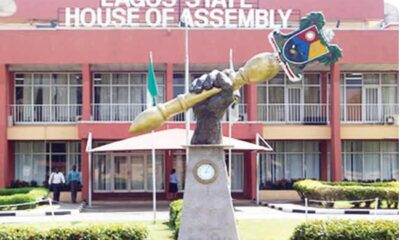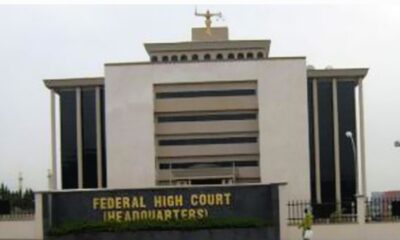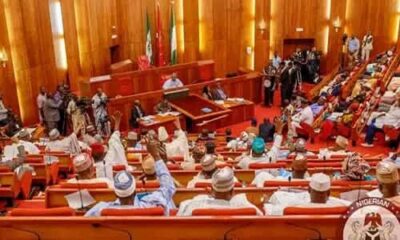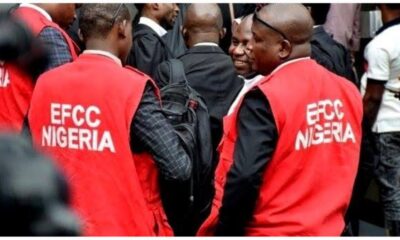Judiciary
Delta chief Judge Tessy Diai Frees 7 Awaiting-Trial Inmates
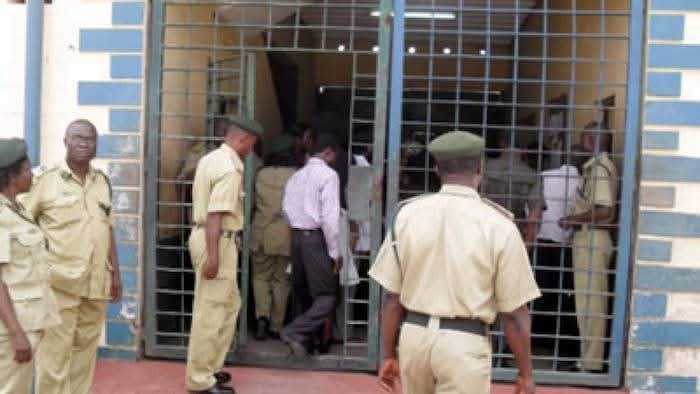
Delta chief Judge Tessy Diai Frees 7 Awaiting-Trial Inmates
Delta chief judge Tessy Diai frees 7 awaiting-trial inmates. The judge said one inmate regained freedom in Warri Correctional Centre while 138 warrants were reviewed in Sapele, but no one was released.
Delta State Chief Judge Tessy Diai has released seven awaiting trial inmates in custodial centres.
This is contained in a statement by Onoriode Etastemi, the public relations officer of the state Ministry of Justice, on Monday.
Ms Diai said the inmates were released following legal advice from the Director of Public Prosecution (DPP), Anthony Orhorhorho, and that they had no case to answer.
While giving the summary of the exercise, which began in Warri Correctional Centre, Ms Diai said the visit commenced on March 10 with 350 warrants reviewed.
The judge said one inmate regained freedom in Warri Correctional Centre while 138 warrants were reviewed in Sapele, but no one was released.
She added that at the Sapele Remand Home, 10 Warrants were reviewed, and no inmate was released. According to her, 181 warrants were reviewed in the Kwale custodial centre, with one person released after spending reasonable time behind bars on arson and kidnapping charges.
Ms Diai explained that in Agbor, 135 Warrants were reviewed, and none was released, while at Ogwashi-Uku, 428 warrants were reviewed, and five persons regained their freedom.
The breakdown indicates that 1,228 Warrants were reviewed, but none were granted bail.
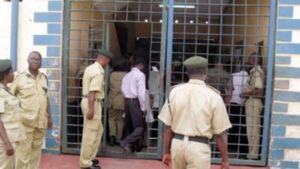
Delta chief Judge
Ms Diai appreciated everyone who participated in the exercise, including the DPP and his team, for their diligence and hard work, which translated into a faster and smoother dispensation of justice in the state.
She added that the essence of the visit was to ensure that custody cases go smoothly in court.
Those set free from the Ogwashi-Uku Correctional Centre are Yohanna Selnan, John Tanko, Gwak Imana, Ventim Usman, and Chukwuemeka Ugwu, all male.
Mr Ugwu said he was arrested for robbery and kidnapping, which he knew nothing about. He appreciated the chief judge for setting them free.
Crime
Nnamdi Kanu Says There’s No Charge Against Him, Refuses To Open Defence

Nnamdi Kanu Says There’s No Charge Against Him, Refuses To Open Defence
Nnamdi Kanu says there’s no charge against him, refuses to open defence. Nnamdi Kanu, leader of the Indigenous People of Biafra (IPOB), has refused to open his defence in the terrorism charge filed against him.
At the resumed proceedings on Monday, Kanu who has opted to defend himself after sacking his team of lawyers, said he has gone through his case file and there is no charge against him.
“Join me in praising God. I have gone through my case file, and there is no charge against me,” he started.

Nnamdi Kanu
“There is no extant law in this country upon which the prosecution can predicate the charges against me. If there’s any, let my Lord read it out to me.
“So, I should not enter any defence in a charge that does not exist under any law in Nigeria. I urge you to release me today or grant me bail.”
Economy
Atiku Slams Tinubu Over ‘Reckless’ Presidential Pardon Says “It Undermines Justice, Emboldens Criminality”
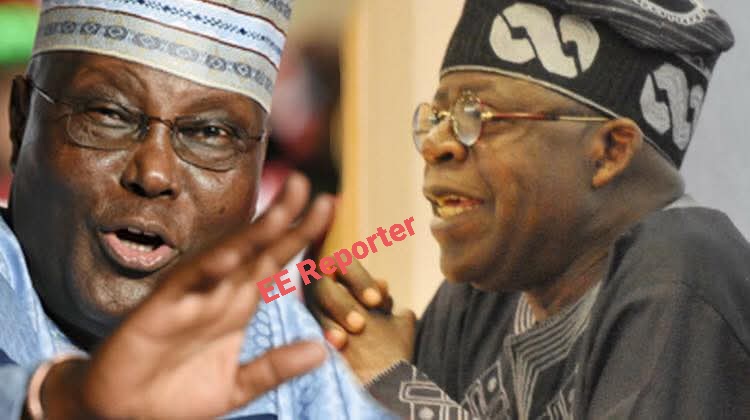
Atiku Slams Tinubu Over ‘Reckless’ Presidential Pardon Says “It Undermines Justice, Emboldens Criminality”
Atiku slams Tinubu over ‘reckless’ presidential pardon says “It undermines justice, emboldens criminality”. Former Vice-President Atiku Abubakar has criticised President Bola Tinubu for what he described as the “reckless and morally indefensible” use of presidential pardon.
In a statement on Sunday, Abubakar said the latest exercise of clemency by Tinubu “undermines justice and emboldens criminality,” arguing that it betrays the spirit of the constitutional power it is meant to represent.
“The recent announcement of a presidential pardon by President Bola Ahmed Tinubu has, as expected, provoked outrage across the nation,” Abubakar said.
“Ordinarily, the power of presidential pardon is a solemn prerogative, a moral and constitutional instrument designed to temper justice with mercy and to underscore the humanity of the state.
“When properly exercised, it elevates justice and strengthens public faith in governance. Regrettably, the latest pardon issued by the Tinubu administration has done the very opposite.”
He said granting clemency to individuals convicted of serious crimes such as drug trafficking, kidnapping, murder, and corruption “not only diminishes the sanctity of justice but also sends a dangerous signal to the public and the international community about the values this government upholds”.
“At a time when Nigeria continues to reel under the weight of insecurity, moral decay, and a surge in drug-related offences, it is both shocking and indefensible that the presidency would prioritise clemency for those whose actions have directly undermined national stability and social order,” he added.
The former vice-president said it is “particularly worrisome” that nearly a third of those pardoned were convicted for drug-related offences.
“Particularly worrisome is the revelation that 29.2 percent of those pardoned were convicted for drug-related crimes at a time when our youth are being destroyed by narcotics, and our nation is still struggling to cleanse its image from the global stain of drug offences,” he said.
“Even more disturbing is the moral irony that this act of clemency is coming from a president whose own past remains clouded by unresolved and unexplained issues relating to the forfeiture of thousands of dollars to the United States government over drug-related investigations.
“It is, therefore, no surprise that this administration continues to demonstrate a worrying tolerance for individuals associated with criminal enterprise.”
According to him, a presidential pardon is meant to symbolise “restitution and moral reform,” but Tinubu’s action “has become a mockery of the criminal justice system, an affront to victims, a demoralisation of law enforcement, and a grave injury to the conscience of the nation.”
“Clemency must never be confused with complicity,” Atiku said, adding that “when a government begins to absolve offenders of the very crimes it claims to be fighting, it erodes the moral authority of leadership and emboldens lawlessness,” the former vice-president.
“Nigeria deserves a leadership that upholds justice, not one that trivialises it.”

Tinubu, Atiku
Recently, 175 persons received a presidential pardon following the approval of the national council of state.
Among the 175 beneficiaries are Herbert Macaulay, one of Nigeria’s foremost nationalists; Farouk Lawan, a former member of the house of representatives; Mamman Vatsa, a major general and poet executed in 1986 over alleged treason; and Maryam Sanda, who was sentenced to death for killing her husband in 2017.
Drug offenders, illegal miners, white-collar convicts, and foreigners are also among the recipients of the presidential pardon.
In a statement on Saturday, Bayo Onanuga, special adviser to the president on information and strategy, said Tinubu granted clemency to most of the convicts based on reports that they had shown remorse and good conduct.
Crime
High Court Adjourns Yahaya Bello’s Money Laundering Trial Until November 12

High Court Adjourns Yahaya Bello’s Money Laundering Trial Until November 12
High court adjourns Yahaya Bello’s money laundering trial until November 12. Mr Bello is charged alongside Umar Oricha and Abdulsalami Hudu with a 16-count charge bordering on alleged property fraud to the tune of N110 billion.
Justice Maryann Anenih of the Federal Capital Territory High Court on Thursday adjourned the hearing in the alleged N110 billion fraud instituted against former governor of Kogi, Yahaya Bello, and two others until November 12.
Mr Bello is charged alongside Umar Oricha and Abdulsalami Hudu with a 16-count charge bordering on alleged property fraud to the tune of N110 billion.
At the resumed hearing, the Economic and Financial Crimes Commission (EFCC) called its fifth witness, Victoria Oluwafemi, a compliance officer with Polaris Bank.
The witness told the court that the total credit to the account in question came from different senders, adding that the transfers from the account were in multiples of ₦10 million.
She said the total credit in November 2021 was ₦450 million.
While being cross-examined by the counsel to the first defendant, Joseph Daudu (SAN), the witness admitted that she was not the accounts officer for the two accounts in the bank.
She also admitted that, because she was not the accounts officer, she did not know how the transactions on these accounts were carried out.
Counsel to the second defendant, A.M Aliyu, while cross-examining the witness, asked her if the name of Mr Hudu was in the portion shown to her in Exhibit M. She responded that it wasn’t.
The sixth prosecution witness (PW6), Mshelia Arhyel, was then called for cross-examination.
Mr Daudu told the court that he had not concluded the cross-examination of the same witness in another court on a similar subject matter.
The court, however, held that the matter before it was independent and that the defence counsel held the discretion to cross-examine or not.
During the proceedings, the prosecution sought to tender certain documents through the subpoenaed witness.
The court, however, held that the matter before it was independent and that the defence counsel held the discretion to cross-examine or not.
The prosecution sought to tender certain documents through the subpoenaed witness.
Counsel to the first defendant objected to the admissibility of the documents, arguing that they did not comply with the provisions of Sections 83 and 84 of the Evidence Act.
He further indicated his intention to address the court more extensively on the points of objection at a later stage.
Counsel to the second defendant, Mr Aliyu, also objected, relying on the same statutory grounds.
The prosecution counsel, Kemi Pinheiro (SAN), urged the court to discountenance the objections raised by the defence team and admit the documents in evidence.
The court admitted the document, a 218-page statement of account of Alusha Services, signed by the witness, Mshelia Arhyel, and marked P1 en bloc.
The prosecution asked similar questions posed to the same witness at the June 26, 2025, examination before Justice Emeka Nwite of the Abuja Division of the Federal High Court.
He reiterated that, prior to 2023, there was no strict withdrawal limit as long as the amount written on the cheque did not exceed ₦10 million.
The EFCC counsel told the witness to examine the transactions of February 22, 23, and 25 and March 3, 2016, up to May 6, 2022.
He confirmed multiple transactions of N10 million each, admitting they were within the approval threshold, which put the total transactions as of January 31, 2018, at N707,267,000.

Yahaya Bello
“Please confirm that, notwithstanding the multiple withdrawals made on the same day, they were all within the approved withdrawal threshold,” prosecution counsel said.
“Yes, my Lord,” the witness responded.
On the account statement of Aleshua Solutions Services and transactions from May 6, 2022, the witness said the first entry was a transfer in favour of Aleshua Solutions Services by B.O. Rosemary Chukwuma, in the sum of $2,500.
“The second is a transfer in favour of Yau for $5,000. The third is also a cash transfer of $5,000 to Yau,” he stated.
The witness also confirmed certain transactions in December 2016 from the Kogi State Internal Revenue Service, totalling N202 million.
The judge then adjourned until November 12 for the continuation of the examination of the sixth witness.
-
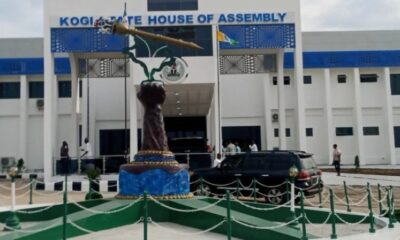
 Crime9 months ago
Crime9 months agoKogi Assembly Considers Law To Regulate Rent, Establish Control Board: Tenancy Law
-

 News10 months ago
News10 months agoAtiku Reveals Why He Failed To Pick Wike As Running Mate In 2023
-

 Crime12 months ago
Crime12 months agoFederal High Court Jails 2 For Vandalizing Transformer, Telecom Mast In Kogi
-

 Akwa Ibom1 year ago
Akwa Ibom1 year agoThe Apostolic Church Gets New Territorial Chairman, Exco
-
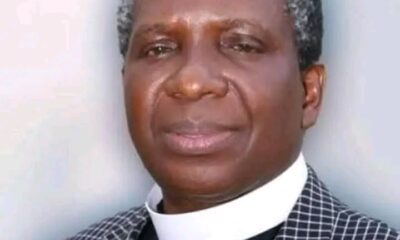
 News12 months ago
News12 months agoThe Apostolic Church Gets New National President, Executive
-
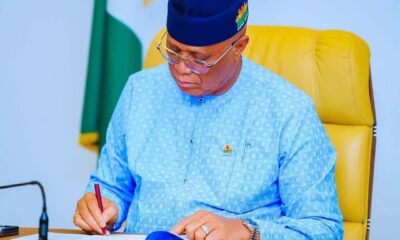
 Akwa Ibom1 year ago
Akwa Ibom1 year agoUmo Eno Commences Payment Of 80,000 Naira Minimum Wage With Arrears
-

 News11 months ago
News11 months agoSenator Natasha Returns To Senate With Husband Amid Seat Dispute
-

 Economy9 months ago
Economy9 months agoKiyosaki: Is Tinubu’s Government Afraid Of Ibrahim Traore?

